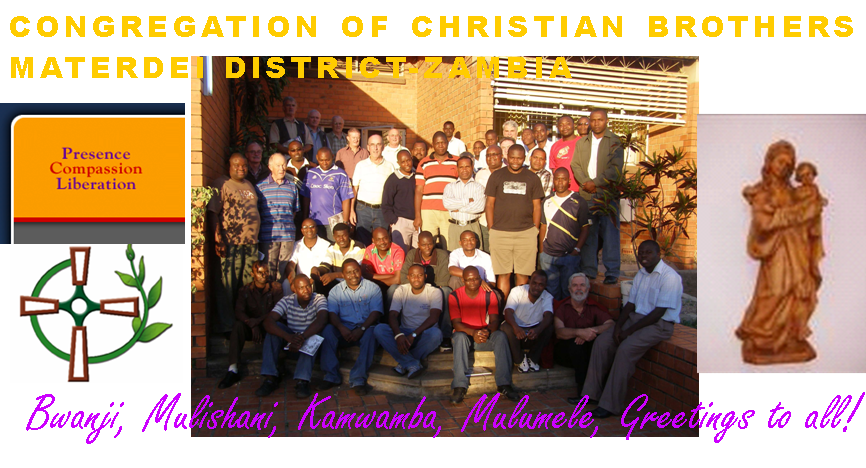“In communion of Divine Life” Until failing health took Liguori back to his native England last year, he spent many years in Africa. Seamus O’Reilly, who lived in community with him in Lusaka, Zambia, captures his memories of Liguori the day after his death on 18 May 2011.
Glory be to God for dappled things –
For skies of couple-colour as a brinded cow;
For rose-moles all in stipple upon trout that swim
Fresh-firecoal chestnut-falls; finches’ wings;
Landscape plotted and pieced – fold, fallow, and plough;
And all trades, their gear and tackle and trim. (Gerard Manley Hopkins)
In my life as a Christian Brother I have been blessed to live with some truly beautiful men. William Liguori Gillespie was one of these. Liguori was kind and gentle, patient and occasionally impetuous, consciously laid-back and nervously anxious, compassionate and courageous, understanding and caring, interested and encouraging, inquisitive and wise, trusting and trustworthy. He was a friend and a brother.
Some years ago I visited a maritime museum in Greencastle, County Donegal, where one section is dedicated to the Gillespie family who were river pilots on Lough Foyle. One photograph shows “Black Jack Gillespie” who in stature and pose is the image of our brother Liguori. When I returned to Lusaka I began to jocosely address Liguori as “Black Jack Gillespie – poet, patriot, and pilot”. Liguori would give a wry smile but deep down he was immensely proud of his family and he delighted that we would pay homage to his ancestors.
Liguori’s father spent most of his life as a captain in the British Merchant Navy. Liguori always spoke of his father with great affection and he often related two stories about him. The first was that his father as captain of the ship always went into the galley after a meal to thank the cook. The second was that he often saw his father kneel on a chair and pray in the evening time. Liguori himself was always most gracious for any service rendered and he was a man of prayer.
Liguori spoke of a painting which hung in the dining-room of his boyhood home – a portrait of his uncle Jack in military uniform, painted by his mother. Jack was his mother’s favourite brother. He died in battle as a young man in the First World War and was buried in Flanders. He symbolized the total commitment that Liguori pledged to the Congregation of Christian Brothers.
In his schooldays, Liguori was a competent scrum-half. He retained a keen interest in rugby and rejoiced in England’s victories. The successes of Liverpool always brought delight to his heart.

Liguori overlooking the Zambezi River
Liguori loved study. He recalled happy days in Cambridge when the well-known Australian Brother Irenaeus McCarthy would cause bedlam in the community by asking outrageous questions of the then community leader. Liguori had a wonderful inquisitive mind and when he was in Berkeley he explored many areas. He caused me to smile as he related how he became involved with a Buddhist prayer group whose mantra was “I don’t know”. He delved in the mystery of dreams with Jeremy Taylor, and also sat in utter silence with the Society of Friends.
Liguori loved teaching and sharing his fund of knowledge with young people. During his years in Lusaka he taught Scripture to young religious. He was intent on revealing to young people that Jesus was a Jew. He loved to celebrate Jewish meals and rituals with his students so that he could convey to them the real meaning of Jesus’ message. He also attended the Jewish synagogue here in Lusaka on a number of occasions and met regularly with a small group to study the week’s portion of the Torah.
He had extraordinary patience with the poor and the sick. During his years in Lusaka, he visited the bedridden AIDS sufferers at Mother Teresa’s hospice every day. He spent hours with them, reading them newspapers, holding their hands and praying with them. He provided them with an experience of kindness and compassion.
He could also be impetuous and impatient. As a young man he longed to be the ideal Christian Brother but alas he was conscious of fragile areas in his life. Impetuously he endeavoured to meet and speak with Chiara Lubec, the foundress of the Focolari, but a minder prevented him from having a conversation with her. He did however meet and talk with St Padre Pio, whose only comment to him was “Pazienza, pazienza”.
Liguori loved Africa, and Sierra Leone Liberia and Zambia in particular. He had a deep respect for African culture and on at least one occasion he encouraged Brothers to beat out a haunting African rhythm on individual drums as they sat in the community oratory and allowed themselves to be embraced by the loving presence of the Divine.
Liguori was basically a simple man. His material needs were small, though he had a wonderful curiosity for new ideas. He was a tremendous listener and was very life-giving to people he accompanied on their spiritual journey. I had the wonderful privilege to live with him. I was absolutely certain that he was my friend who would celebrate with me by sharing a glass of whiskey, and who could cry with me when we had occasion to share our pain and our brokenness. He was a true brother of Christ, of Edmund Rice, and of each of us. We retain vivid life-giving memories and we are most grateful to his parents and his brothers and sister who generously gifted us, the sons of Blessed Edmund Rice, with Liguori.
A thing of beauty is a joy for ever:
Its loveliness increases; it will never
Pass into nothingness; but still will keep
A bower quiet for us, and a sleep
Full of sweet dreams, and health, and quiet breathing. (Keats)
[Seamus O’Reilly]
Christian Brother-Zambia DLT
May 2011


No comments:
Post a Comment
Thank you for commenting.